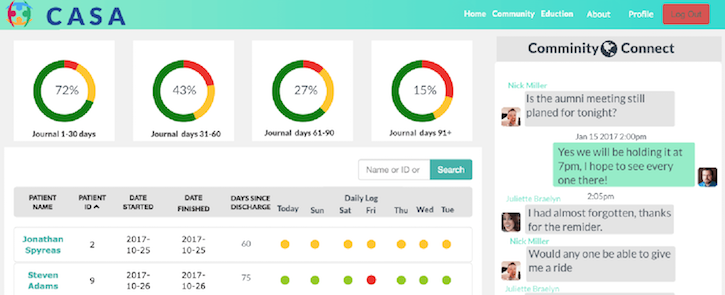- Politics
- Diversity, equity and inclusion
- Financial Decision Making
- Telehealth
- Patient Experience
- Leadership
- Point of Care Tools
- Product Solutions
- Management
- Technology
- Healthcare Transformation
- Data + Technology
- Safer Hospitals
- Business
- Providers in Practice
- Mergers and Acquisitions
- AI & Data Analytics
- Cybersecurity
- Interoperability & EHRs
- Medical Devices
- Pop Health Tech
- Precision Medicine
- Virtual Care
- Health equity
Can Telehealth Combat the Opioid Crisis?
A platform designed to help people remain in recovery is telemedicine’s latest tool.

Images have been cropped and resized. Courtesy of Q2i.
When a person recovering from opioid addiction leaves rehab, it is just the start of the journey. Heroin and similar drugs have ushered in a nationwide epidemic for a reason: They are notoriously difficult to kick, and that is borne out in the statistics, which claim that 91% of opioid addicts will relapse, and as much as 80% will do so within a month after exiting detox. It all means that completing a program is no guarantee of success.
The healthcare technology company Q2i introduced today a telehealth platform that it hopes will ease the return home for people with all kinds of substance abuse disorders, from opioids and methamphetamines to alcohol and beyond. The app, CASA (a stand-in for Continuing Alumni Support Application), links healthcare providers with patients, especially those who are fresh out of rehab, a halfway house, or an intensive outpatient program, according to Q2i’s announcement.
“Leaving a residential facility or outpatient program and navigating the transition back into daily life can be difficult, sometimes overwhelming and oftentimes dangerous, too,” the organization wrote. “CASA enables healthcare providers to deliver continuing recovery support and is used to regularly deliver an increased level of connection, support, and after-treatment care to patients.”
In recent years, telehealth’s reach and potential have taken off, helping to provide all sorts of treatment for patients who otherwise might be deprived of care. At the same time, the opioid epidemic has mushroomed. The national crisis has ravaged families and communities of all backgrounds, killing tens and thousands of people each year and sending many more to rehab clinics, which often fail to lay the foundation for long-term recovery.
The simultaneous rise of telemedicine and the opioid crisis has led private companies, researchers, and public entities to explore how the former might quell the latter. The US Substance Abuse and Mental Health Services Administration, for instance, encourages community behavioral health clinics to use telehealth as workforce and facility bed shortages persist. Rural health advocates in particular have been steadfast in their belief that telehealth could help isolated, downtrodden populations overcome addictions. Similar initiatives have turned up promising results for people with alcoholism.
So, it makes sense that Q2i would focus its efforts on this intersection. But how, exactly, does the company plan to make a dent in the opioid problem?
CASA not only offers people in recovery mobile access to providers but also fellow sober people. The app includes a peer messaging component designed to help strengthen ties and support systems. Further, the app sends post-treatment feedback to the provider, “extending vision and insight into the patient’s recovery journey,” according to the company.
CASA riffs off the organization’s OARS (Opioid Addiction Recovery Support) software, which leverages data to better understand a given patient’s recovery process. It also helps patients with adherence and ownership, the company said.
Given the persistence of the opioid crisis, it is unlikely that any single healthcare technology can halt this juggernaut. But, as many commentators and entrepreneurs have said, tech has the potential to play a significant role in the fight against opioid abuse. The extent to which telehealth—and apps like CASA—may succeed on a large scale remains to be seen.
Podcast: Adoption of Healthcare Tech in the Age of COVID-19 with Dr Kaveh Safavi
June 22nd 2021Kaveh Safavi, MD, JD, global health lead of Accenture Health, discusses how the pandemic influenced the speed at which healthcare organizations adopted new technologies and how this adoption is impacting patient care.
